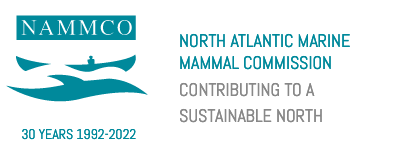Blog: NAMMCO 25 years
NAMMCO is 25 years old
25 years, mature and young at the same time! Already well on the way, but still so much remaining.
25 years, like my daughter. Still young, but also moving fast to her future. Having accomplished and seen a lot, but with still much more to accomplish, adding successes and being carried forward by them.
Similarly, NAMMCO is at the same time an old and a young organisation. It was born under a good star, in 1992, the same year the world adopted the Principle of Sustainable Development enshrined in the Rio Declaration and its Agenda 21.
NAMMCO is an organisation with a lot of potential to develop. A lot has happened in the first 25 years, but much remains to be done.
Many stocks in the North Atlantic are regularly assessed by NAMMCO to make sure that the hunting targeting them is well managed and takes are sustainable. Management measures proposed by NAMMCO have been implemented, resulting in population recovery for several stocks of narwhals, belugas and walruses.
Many stocks still need to be assessed, including some that are hunted or by-caught. This in part because of the difficulty in surveying species that may have a patchy distribution over a huge and often remote area, like bearded seals and ringed seals.
Favourable environmental conditions have, of course, also played a role in the recovery of depleted marine mammal stocks. Some stocks are increasing at rates which were not thought to be possible, like those of humpback whales not only in the North Atlantic but worldwide. But what is favourable for one species is not for another, leaving other species at risk from these same changes.
But where NAMMCO has made proposals for management measures that were implemented, the results have been positive and negative population trends have been stabilised or reversed. So yes, sound management matters — and it gives results.
NAMMCO has proved that the conservation of marine mammals is not the same as complete preservation. Conservation can go hand in hand with utilisation, as long as sustainability is the goal and management measures are informed by rigorous, scientific and regular assessment of the stocks.
So, what now? NAMMCO needs to keep going, to encompass and take advantage of the technological and methodological developments which little by little allow scientists to access remote populations, to better define stock structure, to more reliably estimate population abundance and to better predict population trajectories.
But – and there is a but – hunting impacts are not the only impacts that should be considered. The cumulative impact of other anthropogenic threats, such as climate change, human disturbances, by-catch, pollution, etc., also need to be better taken into account. Their impacts may be less tangible, but they are just as real. Ongoing climate and environment changes will likely have severe impact on the marine and terrestrial ecosystems – and particularly those at the edge.
We shall keep going without losing focus. Keep continue for the next 25 years, so our kids, my grandchildren, will still be able to admire those fantastic and sometimes weird animals that are whales and seals and certainly walruses, but also enjoy a good steak if they wish. Keep conserving nature, so the peoples of the Arctic can maintain their thousands-year old tradition of living from local resources, leaving the lightest and greenest of footprints on our planet.
I am proud to work for an organisation that supports both bio- and cultural diversity.
Happy Silver Anniversary!
by Geneviève Desportes,
General Secretary of NAMMCO
Member of the NAMMCO Scientific Committee in the Faroese delegation, 1992-2014, Chair of the Scientific Committee 2005-2009

About the author
Geneviève Desportes is the General Secretary of NAMMCO. French by origin, Geneviève has lived most of her life in the North – Faroe Island, Iceland, Denmark and presently Northern Norway. Her scientific work focussed on reproduction, nutrition and abundance estimates of small cetaceans, harbour porpoise by-catch mitigation and conservation. Geneviève believes in the sustainable and responsible use of natural resources associated to animal welfare, science supported by traditional knowledge – based management and transparency in management advice and processes. Her goal is to make NAMMCO more visible as an effective regional management organisation and develop its ecosystem approach to management.



